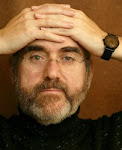But even without this—why is it news? I understand that polls are vital for campaigns who are trying to figure out what people want to hear—it's not pandering, it's politics. Despite what we've seen the past four years, where many politicians have worked solely on political agendas and ignored a majority of their constituents—Politicians are supposed to represent we the people.
So polling is fine for politicians trying to get elected—and even those in office, so they can better represent their constituents.
But why is polling news? How does polling help you and I? Should it matter to us how other people are voting? It does, of course, and it especially does to the notorious "undecideds" who can be swayed by things like, "He's going to win, I want to vote for the winner."
The problem with polls is that they become self-fulfilling prophecies. Election experts and psychologists both say that many people "want to vote for the winner." So if the polls keep telling them that one candidate is going to win, they lean towards that candidate simply because they think he or she will be the winner.
That's not reporting news--that's making news. That's s like TV networks sitting around with crystal balls, trying to tell us what's going to happen, trying to change the future to fit their predictions.
Plus they're notoriously inaccurate. A tradition margin of error of "plus or minus three" simply means that they could be wrong by 6%. When two candidates are against each other, and one has 51% and one has 48%, that's three points. So the poll could say one candidate is "winning" when in reality, they could still lose, even within those very poll results.
And it's not enough for "news" agencies to trumpet polls like election results, they seem desperate to tell us, even months in advance, who will win and who has "already lost."
But they're even more inaccurate about this. Clinton was called "unelectable," by many major pundits and news agencies. But he was elected twice. Howard Dean was "unstoppable" and on both Time and Newsweek. He was absolutely the Democratic candidate, he had no competition, and he would even have beaten Bush if the elections were held in early 2004. But elections aren't held in early 2003, and a few weeks later Dean was history.
As soon as Kerry won the Iowa caucus (not even a real election!), the media dubbed him "unstoppable," and "the winner." This was repeated and repeated, right at the time other states were having elections, and this propelled him to the top. The media gave him the same "unstoppable" treatment they gave Dean, but this time the timing was such that Kerry didn't even need to win all the primaries, because he'd already won in the press.
When I worked on previous presidential campaigns, I saw, first hand, how people are persuaded by polls—especially on election day when I was going door to door trying to get people to vote. Registered voters would just give up and not vote, because the polls "told them who'd already won."
So how, exactly, are these polls strengthening democracy?
They don't. So why not stop running them as if they were news, or worse, election results.
Otherwise, I can see a future like some sci-fi movie. In a few years, government and media will collude and decide elections are too drawn out and expensive. Instead they’ll just poll 1500 likely voters and we’ll all live with whatever the sample tells us. Why bother with polling places when we have polls! And if we fall for that one, you can kiss democracy goodbye for good. Or bad.

No comments:
Post a Comment